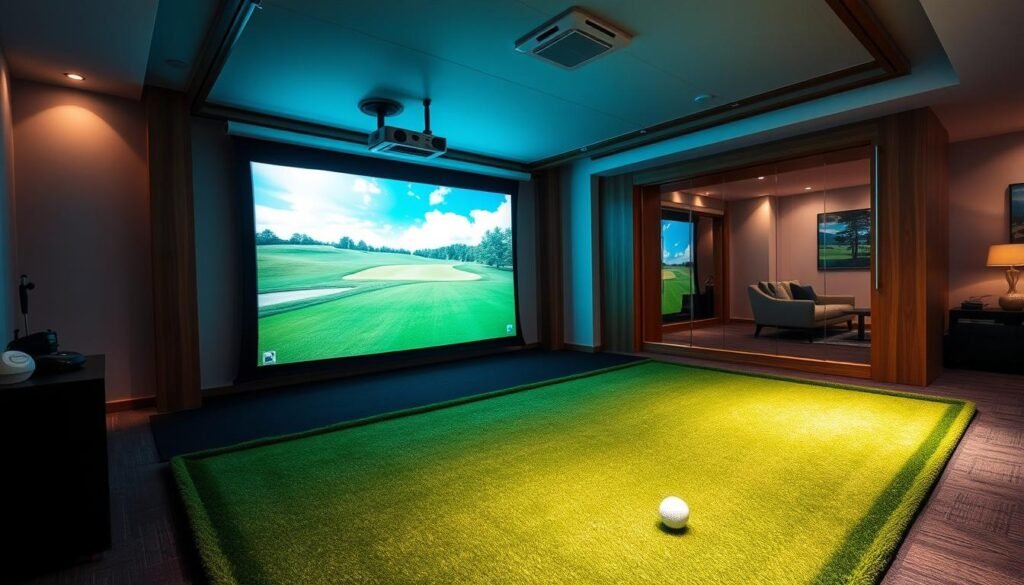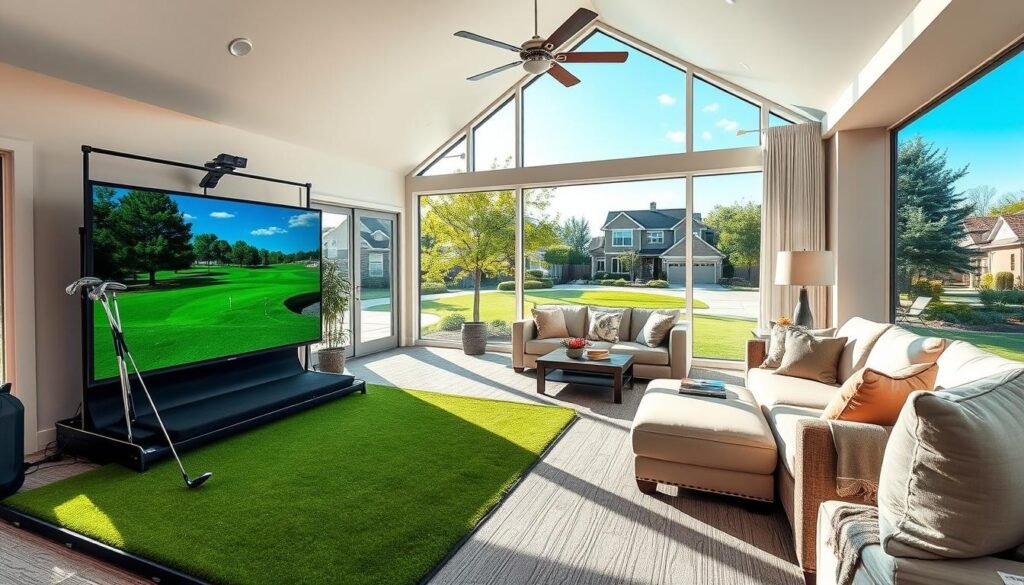Imagine turning unused square footage into a high-tech playground that boosts property appeal while paying for itself. Over 6.2 million Americans have already discovered how cutting-edge recreation tech reshapes living spaces, according to the National Golf Foundation. Modern sports simulation systems blend precision engineering with immersive entertainment, creating multi-purpose areas that defy traditional home design.
Tech-driven upgrades now rival kitchen remodels and patio additions in buyer interest. These installations do more than entertain – they signal innovation, attracting buyers who prioritize unique amenities. While setup costs vary, strategic investments in experiential features often outperform conventional renovations at resale.
Key Takeaways
- Advanced simulation tech creates year-round recreational spaces with pro-level accuracy
- Over 6 million users drive demand for experiential home features
- Tech-forward amenities position properties as modern lifestyle hubs
- Initial costs often yield higher ROI than traditional renovations
- Multi-functional spaces appeal to 72% of luxury home shoppers
- Simulators blend athletic training with premium entertainment value
Understanding Home Golf Simulators
Modern sports technology transforms spare rooms into precision training grounds. These systems combine athletic development with entertainment, creating spaces where practice meets play. Let’s break down how these setups work and what makes them effective.

What Is a Golf Simulator?
A golf simulator replicates real-course conditions through sensor arrays and projection systems. High-speed cameras track your swing path and clubface angle, while infrared sensors measure ball speed and spin rates. Advanced software converts this data into realistic ball flight simulations displayed on impact-resistant screens.
Key Components of a Simulator Home Setup
Every system relies on seven core elements. The launch monitor acts as the command center, capturing 3D swing metrics. Durable hitting mats simulate fairway and rough textures, protecting floors from repeated strikes. High-tension screens handle ball speeds up to 200 mph without damage.
4K projectors create crystal-clear course visuals, while gaming-grade computers process complex physics engines. Subscription-based software grants access to iconic global courses. Enclosure frames keep errant shots contained, ensuring safe operation in compact spaces.
Also read: Golf Simulator: The Ultimate Beginner’s Guide
Space, Installation, and Maintenance Considerations
Converting existing areas into functional practice zones demands precise spatial planning. While basements and garages often work best, attic conversions or bonus rooms above carports can also serve this purpose. Proper layout ensures both safety and performance.
Assessing Your Home Space Requirements
Your setup needs 250+ square feet with specific dimensions. Depth matters most – 18 feet minimum from screen to back wall allows 5 feet behind your swing. Width should accommodate both left- and right-handed players:
- 14-foot room width for centered hitting positions
- 10-foot ceilings to clear club arcs
- 1-foot screen-to-wall gap prevents rebound accidents
Position the hitting mat 10-12 feet from the screen. This spacing lets launch monitors track ball flight accurately. Consider retractable nets if ceiling heights fall short.
The Installation Process and Calibration
High-end systems often need professional installation. Wiring for 4K projectors and sensor arrays requires electrical expertise. Plug-and-play models simplify setup but still demand precise calibration.
Follow these steps for optimal performance:
- Level flooring beneath the hitting mat
- Align projector keystone correction
- Test sensor angles with practice swings
- Update software for latest course mappings
Monthly maintenance includes screen tension checks and mat rotation. Wipe infrared sensors weekly to ensure consistent tracking. Proper care keeps your equipment tournament-ready year-round.
Also read: How Much To Have A Golf Simulator Installed?
Assessing: Does a Golf Simulator Add Value to Your House
Luxury home features now extend beyond traditional upgrades, with immersive sports systems becoming key differentiators in real estate markets. These installations combine athletic functionality with social appeal, creating spaces that serve multiple purposes while elevating a property’s perceived value.

Enhancing Your Property’s Appeal
A premium sports training system introduces luxury entertainment that transcends ordinary home improvements. Buyers recognize these setups as:
- Year-round practice facilities unaffected by weather
- Social hubs for family gatherings and events
- Tech-forward amenities rivaling home theaters
Recent market analyses show properties with recreational tech attract 23% more views in listings. The ability to host immersive game nights or professional-level training sessions creates emotional connections during showings.
ROI and Long-Term Benefits
While installation costs range $15,000-$70,000, these systems often deliver 65-85% cost recovery at sale. Key financial advantages include:
- Higher perceived value compared to pool installations
- Appeal to niche buyer markets willing to pay premiums
- Differentiation in competitive housing markets
Maintenance costs remain low at $300-$500 annually, making these investments more sustainable than many traditional renovations. The combination of recreational utility and modern tech integration positions your property as a lifestyle destination rather than just living space.
Transforming Entertainment and Lifestyle at Home
Tech-powered recreation spaces redefine how families interact with their living environments. These installations merge athletic training with cinematic experiences, creating rooms that adapt to your daily needs while impressing guests.
Year-Round Recreation and Unique Entertainment
Your setup becomes a weatherproof playground where rainstorms and snowdrifts can’t cancel plans. Swing analysis tools break down every shot’s launch angle and spin rate, helping refine techniques between rounds. Friends gather for virtual tournaments on Pebble Beach or St Andrews, turning practice into social events.
Multi-Use Space Adaptability
The same equipment that tracks drives can host movie nights or fitness routines. Swap clubs for yoga mats using the projection screen as your workout guide. Many systems support:
| Activity | Required Add-Ons | Key Benefit |
|---|---|---|
| Soccer Training | MultiSport Software | Footwork Analysis |
| Home Theater | Streaming Device | 120″ Display |
| Virtual Archery | Motion Sensors | Target Practice |
| Dance Workouts | Mirror Mode | Real-Time Feedback |
Technological Sophistication and Modern Living
Infrared sensors and 4K projection systems demonstrate smart home innovation. These features appeal to buyers seeking properties with integrated tech solutions. Your space evolves with software updates – new courses and sports modules keep experiences fresh without hardware changes.
Conclusion
Blending your golf passion with smart home upgrades creates lasting value beyond square footage. These high-tech systems transform underused rooms into dynamic spaces where swing analysis meets family fun. With 72% of luxury buyers prioritizing unique amenities, a well-designed simulator setup positions your property as both recreational haven and tech-forward investment.
The convenience of practicing drives regardless of weather or time constraints revolutionizes skill development. Detailed shot metrics help refine your game while premium software brings world-class courses to your screen. It’s not just about perfecting your swing – it’s about creating an adaptable space that serves as home theater, fitness zone, and social hub.
When considering installation, remember that proper setup impacts long-term enjoyment and resale potential. From impact-resistant screens to precision monitors, quality equipment ensures reliable performance. This investment doesn’t just enhance your daily life – it crafts an aspirational narrative that resonates with future buyers seeking modern living experiences.
FAQ
How much space do you need for a home golf simulator?
You’ll need at least 10 feet wide x 12 feet long x 9 feet high for a comfortable setup. Ceiling height is critical to avoid swing interference. Measure your room carefully and consider retractable screens or compact designs like SkyTrak’s MLM2PRO for tighter spaces.
Can a golf simulator increase property value?
Yes, a premium setup like a Foresight Sports GC3 or TrackMan simulator can boost appeal for buyers seeking luxury amenities. While not a direct appraisal factor, it positions your home as a modern entertainment hub, potentially speeding up resale in competitive markets.
What maintenance does a simulator require?
Regular cleaning of the impact screen and hitting mat (like FiberBuilt or Country Club Elite) is essential. Update software for brands like TruGolf or HD Golf to ensure accuracy. Check projector bulbs and launch monitor sensors quarterly to maintain performance.
Are golf simulators weatherproof?
Indoor setups aren’t weatherproof, but outdoor enclosures like those from Rain or Shine Golf use weather-resistant materials. For year-round use, climate-controlled garages or basements work best. Protect equipment like Uneekor’s EYE XO2 from humidity with dehumidifiers.
Can you repurpose the room for other activities?
Absolutely. Use retractable screens or movable hitting mats to convert the space into a home theater, fitness area, or guest room. Brands like Carl’s Place offer modular enclosures for multi-functional use without sacrificing swing space.
Do simulators improve your actual golf game?
Yes. Systems like Garmin Approach R10 or Full Swing Kit provide real-time swing analytics, ball flight data, and course simulations. Consistent practice with feedback helps refine technique, especially during off-seasons or limited outdoor access.
What’s the average cost for a mid-range setup?
Expect ,000–,000 for a reliable package including a launch monitor (e.g., Bushnell Launch Pro), impact screen, projector, and software. Budget-friendly options like OptiShot 2 start under ,000 but sacrifice advanced features.